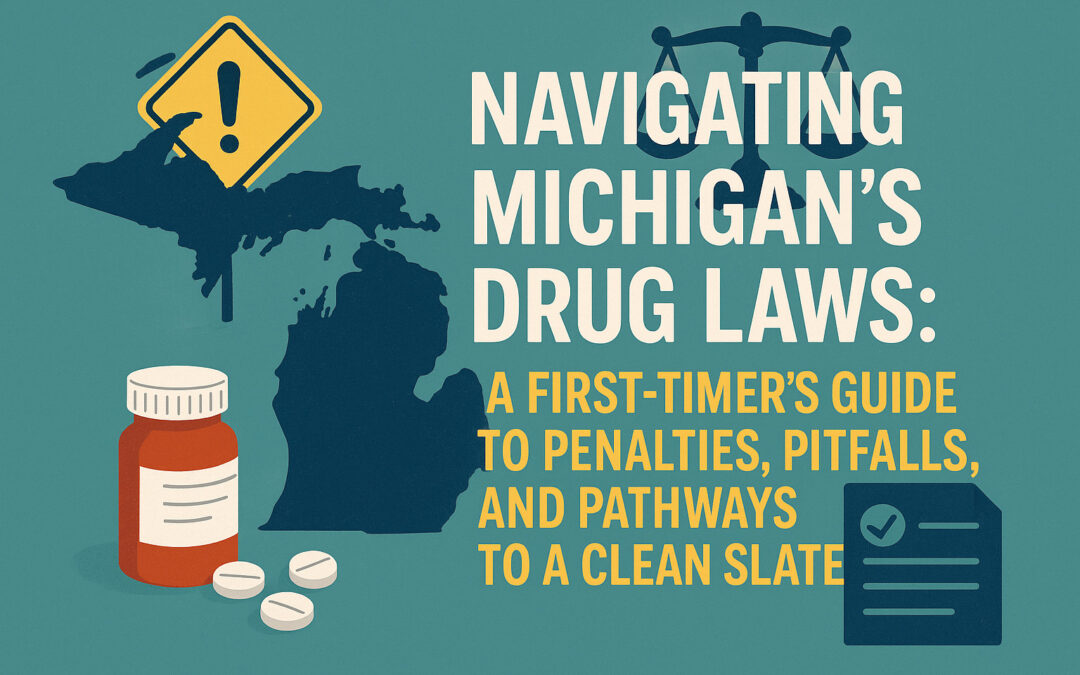Introduction: What a First-Time Drug Offense in Michigan Really Means
Imagine making one misstep, a single lapse in judgment, and suddenly finding yourself facing a future shadowed by legal complexities. In Michigan, a first-time drug offense has the potential to reshape the trajectory of your life.
We’re about to dissect the sometimes-opaque, sometimes-glaring world of Michigan’s drug penalties tailored for the first-time offender. We will move beyond the surface-level anxieties about potential charges and explore the surprisingly accessible routes toward reclamation.
The situation stretches far beyond simple confinement. Consider the burden of hefty fines, the inconvenience of suspended licenses, and a litany of stigmas that follow. But, echoing in the distance, there’s a whisper of hope, a sign of evolution embedded within Michigan’s legal framework.
A Walk Down Memory Lane: How Michigan Got So Tough on Drugs
Let’s take a brief journey through history, back to the fervor of the “War on Drugs.” During the 1970s, Michigan, like the rest of the nation, adopted a stern stance, culminating in the notorious “650-lifer law” of 1978. Possessing a specific quantity of certain substances meant facing life imprisonment. A chilling prospect, indeed.
These mandates ushered in an era where judges were stripped of discretionary power. Consequently, correctional facilities swelled, and criticism mounted. Many argued that the scales of justice had tipped unfairly, especially for low-level offenders.
Then came a break in the clouds. The reforms of 2002 brought a semblance of balance. The rigid mandatory minimums were largely dismantled, granting judges more latitude—a significant step toward nuanced justice.
The Current Landscape: What’s on the Line for a First-Timer Today?
Today, the consequences hinge on key details: the substance involved and the quantity in question. Michigan’s legal framework encompasses a spectrum, from misdemeanors tied to hallucinogens to severe felonies for narcotics such as heroin or cocaine. More information: MCL §333.7403 (Controlled Substances)
Consider the evolving status of marijuana. While recreational use is legal, exceeding possession limits or consuming in unauthorized areas can still lead to incarceration and fines. The paradox is evident. The Michigan Cannabis Regulatory Agency website has more information regarding cannabis regulation in Michigan.
Then there are the heavy hitters: cocaine, heroin, and fentanyl. Even minimal quantities can lead to years of imprisonment and steep fines. As the quantity increases, so do the penalties, potentially culminating in a life sentence and million-dollar fines for large-scale trafficking.
Ecstasy, methamphetamine, and prescription pills also carry substantial felony penalties, frequently leading to lengthy incarceration. The landscape is fraught with potential pitfalls.
Beyond imprisonment, collateral consequences loom: suspended driver’s licenses, mandatory rehabilitation programs, and the indelible mark of a criminal record—which can impede employment, housing, and even civic rights such as voting or firearm ownership.
A Second Chance? Michigan’s Lifelines for First-Time Offenders
Amidst this complexity, rays of hope emerge, offering potential pathways to redemption.
The “7411” program (MCL §333.7411) stands as a testament to this philosophy. Successful completion of probation and court requirements can result in dismissal of the charge, effectively erasing it from your record. A clean slate—but a one-time opportunity.
For younger individuals (ages 17–24) who commit non-violent drug offenses, the Holmes Youthful Trainee Act (HYTA) provides a similar chance to avoid a permanent criminal record—a true lifeline for the young.
Michigan Drug Treatment Courts also offer an alternative route, emphasizing treatment over punishment. These specialized courts focus on rehabilitation, aiming to break the cycle of addiction and crime through support and guidance.
The Great Debates: Where Michigan’s Drug Laws Are Headed
The opioid crisis has ignited intense debate. Lawmakers must balance punitive measures for dealers with expanded access to treatment, Narcan, and drug testing strips for users. It’s a delicate equilibrium.
Despite legalization, the black market for marijuana persists. Policymakers continue to discuss regulatory and taxation strategies that don’t push consumers back toward illicit sources.
The rise of roadside drug testing via oral swabs has also sparked controversy, with privacy advocates citing accuracy and overreach concerns. How do we balance public safety with individual rights?
Meanwhile, several Michigan cities, like Ann Arbor, are decriminalizing psilocybin (“magic mushrooms”), joining a national conversation about their potential therapeutic benefits. Could statewide reform be next?
What the Future Holds: More Changes on the Horizon
Expect more stringent penalties for the manufacture and distribution of fentanyl and related opioids.
Harm reduction strategies will likely take center stage, emphasizing clean syringe programs, greater access to addiction treatment medication, and expanded Narcan availability in schools and communities.
Momentum is also building to expand expungement opportunities beyond marijuana-related offenses, which acknowledges that past mistakes shouldn’t define a person’s future.
Michigan’s approach to drug offenses remains dynamic. Anticipate continued debate and legislative refinement as the state navigates the intersection of public health, justice, and individual liberty.
Conclusion: Know Your Rights, Seek Help, and Stay Informed
A first-time drug offense in Michigan carries serious consequences, but pathways exist to mitigate them.
If you or someone you know is facing charges, contact Rudoi Law today at 248-914-9387. We can guide you through diversion programs and protect your future.


